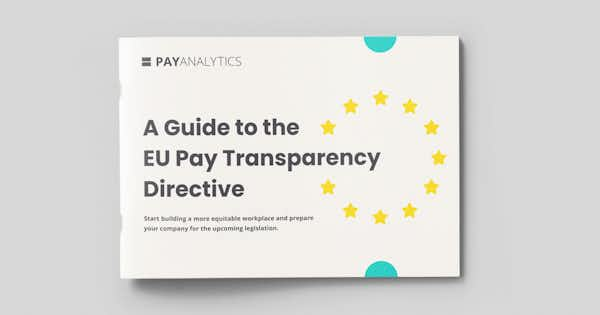Förberedelser inför EU:s direktiv om lönetransparens | Ladda ner vår e-bok gratis

Italy: Pay equity and transparency requirements and EU Directive transposition activity
In 2021, Italy introduced robust pay equity reporting requirements for many employers. While it’s likely that the nation will build on this system to transpose the EU Pay Transparency Directive, specific legislation has yet to emerge.
Italy has taken multiple legislative steps to improve pay equity nationwide. Reflecting the success of these efforts, Italy's current gender pay gap stands at a notably low 2.2%. In 2006, the government legislated that companies adopt standardized criteria, applicable to both men and women, to determine pay. Italy has also developed a national strategy for gender equality that focuses on the years 2021-2026, and it has recently made steps towards transposing the EU Pay Transparency Directive. This article discusses the current reporting requirements, as well as the initial movement towards the transposition of the Directive.
Pay equity and reporting requirements in Italy
One key piece of legislation is Italy’s equal pay law,Law 162/2021, signed on December 3, 2021. This introduced reporting requirements for many employers, as described below.
Who must report?
Reports are mandatory for employers with more than 50 employees and optional for smaller employers.
How often are reports due?
Reports are due every two years on April 30th.
What do these reports need to include?
Reports must include the following:
- Number of employees hired/employed each year, broken down by gender.
- Gender distribution of employees within professional categories and job titles.
- Gender distribution of full-time and part-time employees.
- Data on gender-based differences in pay (base salary and total compensation) and benefits.
- Information about recruitment and candidate selection processes.
- Information about criteria used to determine promotions, professional development, and managerial training.
- Information on measures implemented to promote work-life balance.
- Information on the employer’s diversity and inclusion efforts/policies.
How are reports submitted?
Submissions are digital only, and employers must use the portal set up by the Ministry of Labor and Social Policies.
Gender Equal Certification
One noteworthy aspect of Italy’s commitment to pay equity is the gender equality certificate program. This is open to private companies that meet certain pay equality criteria, as we describe below. Certificate holders receive a tax exemption of 1%, with a maximum of €50,000. They also receive an award score that boosts their eligibility in public bidding for contracts and in applications for EU-level, national, and regional funding.
Applicants are evaluated on their performance in the following areas, which are weighted:
- Culture and strategy – 15%
- Governance – 15%
- HR processes – 10%
- Opportunities for growth and inclusion of women in the company – 20%
- Gender pay equity – 20%
- Protection of parenthood and work-life balance – 20%
Within each area, applicants are measured on a series of key performance indicators (KPIs). Certified organizations have their KPIs monitored annually and verified every two years.
For more information, see our free eGuide on Italian gender equality certification.
EU Pay Transparency Directive transposition activity
In 2024, Italy took initial action to transpose the EU Directive by adopting Law no. 15/2024. This law basically grants the government power to implement the EU Pay Transparency Directive, as well as a few other EU directives. It also sets a 2026 deadline for transposition.
Since Italy already has a robust framework for pay equity data reporting, we expect that the nation will build on and adapt this framework to meet the requirements of the EU Pay Transparency Directive.
However, the Directive only states that employers with over 100 employees must report, while Italy’s reporting threshold is set lower, at 50 employees. It remains to be seen whether Italy will continue to require reports from those organizations with between 50 and 100 employees.
We also note that Italy does not currently have laws that specifically address pay transparency. To comply with the EU Directive, then, it will need to pass legislation on the following:
- Requiring employers to inform job applicants of the starting salary or pay range.
- Prohibiting employers from asking job candidates about their pay history.
- Requiring employers to provide, at an employee’s request, pay ranges for workers doing the same job or work of equal value.
- Mandating the adoption of specific, gender-neutral criteria for employees’ advancement and pay decisions.
- Guaranteeing employees the right to discuss their pay with each other.
We’ll provide further updates on future legislation as it develops in our country-level transposition tracker. And as 2026 draws closer, make sure you are prepared by reading our eGuide to the EU Pay Transparency Directive.
Further support with PayAnalytics by beqom
Pay equity data reporting is already mandatory for many employers in Italy, and the requirements will continue to get more specific as the EU Directive is implemented. PayAnalytics by beqom was designed to make it easy to report your data, with built-in reports that we will update as the EU Directive takes effect. Equally as important, our data dashboards and visualizations help decision-makers understand the data and what it means for the organization’s pay structure, workforce composition, and recruitment and retention strategies.
Once the Directive takes effect, employers throughout the EU will need to commit to narrowing any unexplained gender pay gaps to under 5%. PayAnalytics by beqom is an optimal tool for this process. With just a few clicks, you can identify your organization’s pay gaps and get tailored raise suggestions to close the gap based on your target metrics and budget.
If you have questions about pay equity reporting in Italy, preparing for the EU Directive, or how our software solution could fit into your organization’s toolkit, please get in touch with us to book a demo.
Informationen på denna sida är inte avsedd som juridisk rådgivning och fungerar heller inte som sådan. Hela innehållet, informationen och materialet i denna artikel är endast avsett för allmän information. Läsare bör också vara medvetna om att denna information, såväl juridisk som övrig, inte nödvändigtvis är aktuell.





